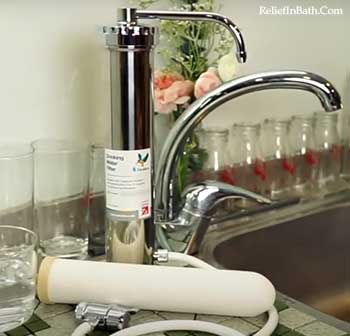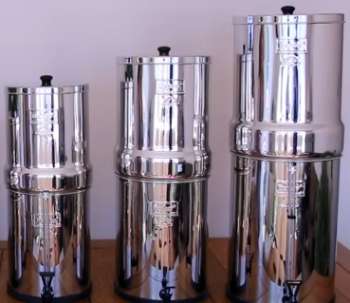Doulton’s ceramic candle filters excel at removing bacteria, cysts, and particulates, while Berkey’s gravity-fed systems target a wider range of contaminants, including viruses and heavy metals. Doulton offers portability and ease of use, while Berkey boasts impressive filter longevity.
Which one reigns supreme?
Join us as we explore the pros and cons of these water filtration powerhouses, helping you make an informed choice for your hydration needs.
Here’s a comparison table to get us started:
| Feature | Doulton | Berkey |
| Filter Type | Ceramic | Ceramic and Carbon |
| Contaminant Removal | 99.99% of bacteria, viruses, and parasites | 99.9999% of bacteria, viruses, and parasites |
| Filter Lifespan | 6-12 months | 3-5 years |
| Maintenance | Replace filter every 6-12 months | Clean and reassemble every 3-6 months |
| Price | 100-300 | 200-500 |
| Flow Rate | 1-2 liters per minute | 1-3.5 liters per minute |
| Certifications | NSF, WQA | NSF, WQA, EPA |
Key Differences Between Doulton And Berkey Water Filters
While both Doulton and Berkey water filters are excellent choices for purifying your water supply, they differ in several key aspects. Let’s delve into the most significant differences between these two powerhouse brands.
- Filtration Method
Doulton: Ceramic/Candle Filtration

The Doulton water filters employ a tried-and-true ceramic candle filtration method.
These candle-shaped filters are made from a proprietary blend of materials, including diatomaceous earth, and are designed to remove contaminants as water passes through the microscopic pores of the ceramic material.
Berkey: Gravity-Fed Filtration
On the other hand, Berkey water filters utilize a gravity-fed filtration system.
These systems consist of an upper reservoir where the unfiltered water is poured, and a lower reservoir where the purified water collects.
The water passes through the filter elements using the force of gravity, eliminating the need for external pressure or power sources.
- Filtration Capacity
Doulton: Lower Filtration Rate
Doulton ceramic candle filters typically have a lower filtration rate compared to Berkey filters. Depending on the specific model, Doulton filters can produce up to 1 gallon of purified water per hour.
Berkey: Higher Filtration Rate
Berkey’s gravity-fed systems boast a higher filtration rate, with some models capable of producing up to 3.5 gallons of purified water per hour. This higher capacity makes Berkey filters a more suitable choice for larger households or situations where a higher volume of purified water is required.
Also Read: Is GLACIER FRESH Water Filter Worth It?
- Filter Lifespan
Doulton: Shorter Filter Life
Doulton ceramic candle filters typically have a shorter lifespan compared to Berkey filters. Most Doulton filters need to be replaced every 6 to 12 months, depending on the specific model and usage patterns.
Berkey: Longer Filter Life
Berkey filters are known for their impressive longevity. Depending on the model and water quality, Berkey filter elements can last up to 6,000 gallons before needing replacement. This extended lifespan can translate into significant cost savings over time.
- Contaminant Removal
Doulton: Bacteria, Cysts, and Particulates

Doulton filters are particularly effective at removing bacteria, cysts, and particulate matter from water.
Their ceramic candle design excels at trapping these contaminants, ensuring that your drinking water is free from harmful microorganisms and sediment.
Berkey: Bacteria, Cysts, Viruses, and Heavy Metals
Berkey filters take contaminant removal a step further by also targeting viruses and heavy metals like lead and mercury.
In addition to removing bacteria, cysts, and particulates, Berkey filters can eliminate a wide range of chemical contaminants, making them a more comprehensive solution for addressing water quality concerns.
- Portability
Both Offer Portable Options
Both Doulton and Berkey recognize the importance of having access to clean water on-the-go.
As a result, both brands offer portable filtration systems designed for camping, hiking, or travel.
These compact and lightweight options allow you to enjoy purified water wherever your adventures take you.
- Maintenance and Replacement
One key difference between Doulton and Berkey filters is their maintenance and replacement requirements. Doulton filters typically need to be replaced every 6-12 months, depending on usage and water quality.
Berkey filters, on the other hand, can last for years with proper cleaning and maintenance.
- Certifications and Compliance
Both Doulton and Berkey filters have earned certifications from reputable organizations such as NSF International and the Water Quality Association (WQA). Berkey filters have also earned EPA certification, which is a testament to their exceptional performance.
Now, let’s dive deeper into the world of Doulton and Berkey water filters.
Doulton Water Filter In Detail
Doulton is a well-established brand in the water filtration industry, with a history dating back to 1827. Their filters use ceramic elements to remove impurities from water, making them a popular choice for those looking for a reliable and effective solution.
Pros of Doulton Water Filters:
- Effective against a wide range of contaminants, including bacteria, viruses, and parasites
- Long-lasting filters that can be cleaned and reused multiple times
- Affordable price point, with options available for under $200
- Easy to install and maintain
Cons of Doulton Water Filters:
- Filter replacement can be expensive, with some models requiring frequent replacements
- Flow rate can be slow, especially for larger households
- Some users have reported issues with filter clogging and maintenance
Berkey Water Filter In Detail

Berkey is another well-known brand in the water filtration industry, with a reputation for producing high-quality filters that can remove an impressive range of contaminants.
Their filters use a combination of ceramic and carbon elements to provide comprehensive protection against waterborne pathogens.
Pros of Berkey Water Filters:
- Exceptional contaminant removal capabilities, including fluoride, lead, and mercury
- Long-lasting filters that can last for years with proper maintenance
- High flow rate, making them suitable for larger households
- Durable and built to last, with a reputation for withstanding heavy use
Cons of Berkey Water Filters:
- Generally more expensive than Doulton filters, with prices ranging from 200 to over 500
- Requires regular cleaning and maintenance to ensure optimal performance
- Some users have reported issues with filter clogging and slow flow rates
Which One Is Right For You?
So, which filter reigns supreme?
The answer ultimately depends on your specific needs and preferences. If you’re looking for an affordable, easy-to-maintain filter that still provides excellent contaminant removal, Doulton might be the way to go.
On the other hand, if you’re willing to invest in a higher-end filter that offers exceptional performance and durability, Berkey is definitely worth considering.
Also Read: Is Waterdrop Better ZeroWater Water Filter?
Frequently Asked Questions (FAQ)
Doulton and Berkey filters both offer excellent contaminant removal capabilities, but Berkey filters tend to outperform Doulton in terms of flow rate and durability. However, Doulton filters are often more affordable and easier to maintain.
Berkey filters are known for their exceptional performance, but other brands like Soma and ZeroWater offer similar capabilities. However, Berkey’s unique combination of ceramic and carbon elements sets it apart from the competition.
Doulton offers a range of filters, but the Doulton HCP and Doulton W9125065 are popular choices among customers. The best filter for you will depend on your specific needs and preferences.
Doulton filters typically need to be replaced every 6-12 months, depending on usage and water quality. However, some filters can last longer or shorter depending on various factors.
Final Thoughts
Choosing the right water filter can be a daunting task, but by considering your specific needs and preferences, you can make an informed decision.
Doulton and Berkey filters both offer unique advantages and disadvantages, but ultimately, the best filter for you will depend on your budget, maintenance habits, and contaminant removal requirements.
By weighing the pros and cons of each, you’ll be well on your way to enjoying clean, safe drinking water for years to come.
